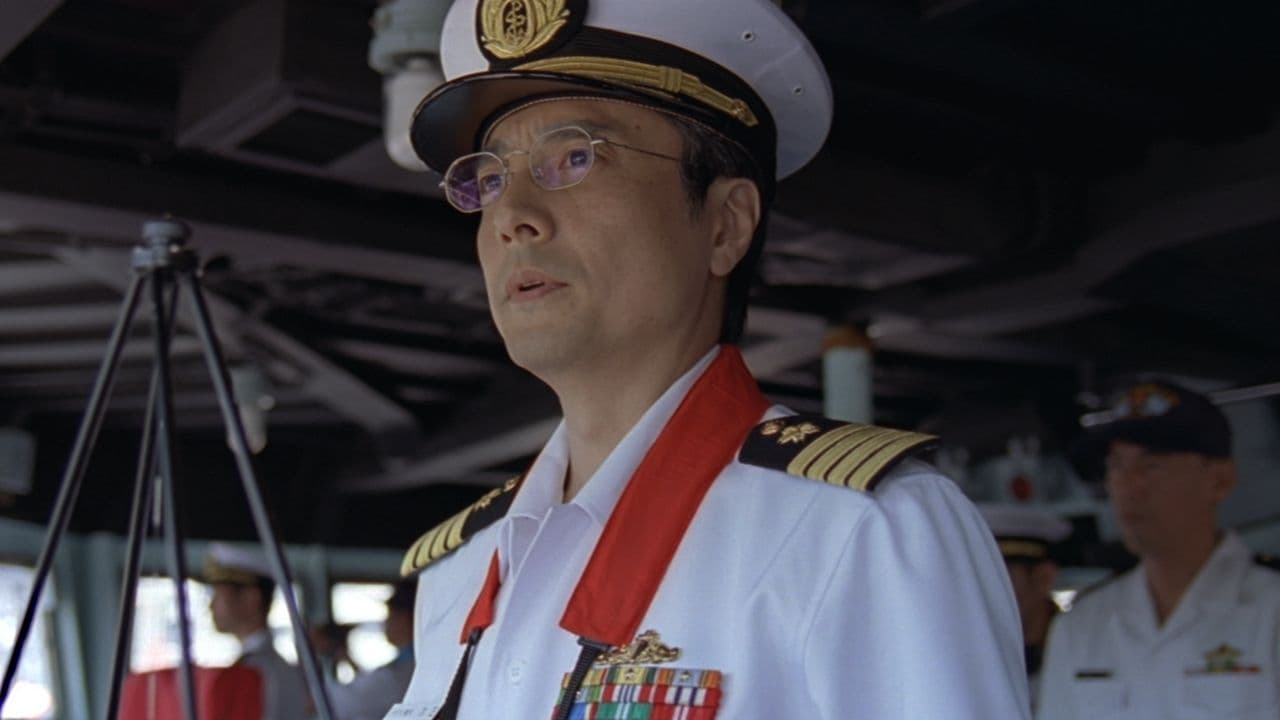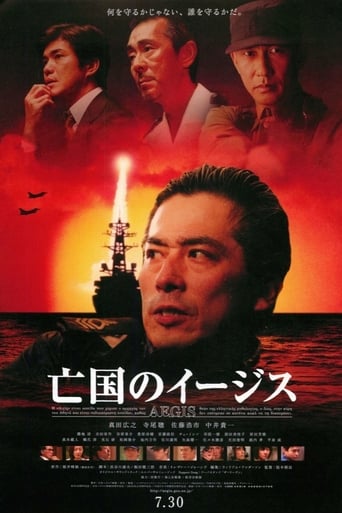IslandGuru
Who payed the critics
Supelice
Dreadfully Boring
SparkMore
n my opinion it was a great movie with some interesting elements, even though having some plot holes and the ending probably was just too messy and crammed together, but still fun to watch and not your casual movie that is similar to all other ones.
Kimball
Exactly the movie you think it is, but not the movie you want it to be.
dmuel
Aegis is an entertaining movie. If you like action yarns like "Die Hard" or "Under Siege", this movie fills the bill. Betrayal in the upper ranks of the Japanese Navy allows a foreign agent to threaten Japan with a deadly chemical bomb. A Japanese destroyer equipped with the AEGIS system, a defensive mechanism that renders it nearly impervious to conventional air assault, is carrying the stolen weapon to Tokyo. How to stop it?? There is a lot of political undercurrent in the movie. If you've looked at some of the other comments from Japanese viewers you get some idea of what it's all about. What is Japan's role in the world? Is a nation under threat, as Japan now sees itself, able to live with a pacifist constitution? These questions are asked repeatedly in the film and events suggest what the answers could or should be.It is interesting that the weapon threatening Tokyo is of American making, that the agent's acquisition of the weapon is due to some sort of American blundering and, as one character in the movie relates matters, it is now Japan's job to clean up the mess. Additionally, the nationality of the "foreign agent" is never identified, but his name and several clues strongly suggest, to this viewer at least, that he is of North Korean extraction. One could conjecture at length what all of this implies, but I'll leave that to the individual viewer.I would add that, at about 2 hours 15 minutes, the movie is a little too long. Some of the hand-wringing over questions of nationhood and national defense are inserted at awkward moments for an action yarn. But judging from Japanese viewer comments these scenes had some resonance. A less passionate audience is apt to see this for the melodrama it is. As far as Hollywood "fast food" content, this film is chock full of it. Some of the action sequences are clearly cliché and borrow heavily from older American flicks like "Die Hard". In spite of these several weaknesses, this is still enjoyable entertainment.
yossarian100
Similar to UNDER SIEGE, where a handful of good guys attempts to retake a naval vessel from terrorists, only no Erika Eleniak topless in this one. Our hero succeeds, not because of his tremendous skills in martial arts and Ranger training, but because he clings stubbornly to his own sense of duty as a Chief Petty Officer in the Japanese Navy, refreshingly uncomplicated. He just won't give up.The film takes the time to not only tell a story but also to trot out some rather nationalistic political philosophy about Japan becoming more aggressive on the international scene by moving its military away from its defensive only posture and not being so chummy with America.Actually, the movie is both entertaining, intriguing, and somewhat silly...almost like a good Godzilla movie...but it works. I gave it a "7" primarily because it was enjoyable to watch and the characters were interesting enough to care about.
Syd Mori
Aegis (2005) - Wrong Way to Make a Movie Note: This "comment" may contain "spoilers", but only in the sense that it's not worth watching. "Aegis" (meaning "shield") was a little disappointing. Following "Lorelei: The Witch of the Pacific Ocean" and "Sengoku jieitai 1549", I probably placed too much expectations on the third film based on novels written by Harutoshi Fukui. The film uses real SDF (Self-Defense Force) vessels, and I don't know how much the producers had to pay for this, but there were obvious budgetary problems. The CG is low-grade, or is omitted entirely. The ship, Isokaze, sinks another SDF vessel, but this scene is depicted only in the form of a distant flare of explosion seen from Isokaze. If not for budgetary reasons, this scene should have been a highlight of the film, depicted in full CG.Another major problem about this film is that non-Japanese who don't know anything about SDF or Japanese Constitutional issues or history will probably understand nothing about what is going on in the film. For instance, the SDF is a military organization, but many of the operations that its naval division should be carrying out are in reality carried out by another government agency "Japan Coast Guard" (JCG). In contrast to the naval SDF which is even prohibited from operating outside Japanese waters with a few exceptions, the JCG vessels, though not equipped with long-range weapons, are authorized to engage in counter-terrorist and -piracy operations anywhere in the world. A few years ago, several JCG vessels chased what it said was a North Korean spy vessel to outside Japanese waters and into Chinese waters where they sank the vessel killing all its crew. The JCG is also authorized to sign international agreements that concern maritime affairs, with the Foreign Office only needing to acknowledge such agreements after the fact. Additionally, some of you Japanophiles might remember how the novelist Yukio Mishima died. He visited an SDF headquarters in Tokyo and called upon the soldiers there to realize what they were there for. No one responded, so Mishima committed hara-kiri suicide in front of the Japanese public. The original title translates as "Aegis of a Nation in Demise". The majority of the Japanese feel that something is wrong about their nation, but don't know the answer or are simply not interested. Like the other two films based on Fukui's novels, "Aegis" treats the same kind of theme, namely What is war? What is nation? What does it mean to kill your enemy? Can you really kill another human being because he happened to be your enemy? These questions are utterly irrelevant to the people of the majority of the nations of the world which are fighting for survival or national interest. Some of you might remember U.S. President Bush's slip of tongue when he said the war against Saddam Hussein was a "crusade". This means that Japan joined the Iraqi war when it was not even a Christian country. No one here even noticed this issue. The fundamental question and theme of "Aegis" is that Japan has full- fledged land, naval and air forces, but its people don't know what these are for, what it means to fight, what it means to defend their nation, or even what a "nation" is. This is the meaning of the title "Nation in Demise", implies Fukui. "Aegis" probably takes lines right from the novel. For this reason, statements are often interesting. "Peace is a kind of void between wars". Or, "Japanese didn't earn peace; they were just given it" (by the United States) says the terrorist leader played by Kiichi Nakai who usually appears in films and dramas as a typical Japanese soldier (interesting casting). But the film was disappointing, because it seemed like it just took the main plot and words from the novel and did nothing else than to let the SDF advertise its state-of-the-art Aegis vessel. And, partly for the mentioned omission of the scene of another SDF vessel being Harpoon-sunk by Isokaze, the entire film lacks the tension that the novel probably had, and also lacks the detailed character development that the novel probably spent a lot of pages for. We are just presented with this cold-hearted terrorist leader. But there is a girl who seems like his relative. We are supplied nothing about the relationship between these people, or the real feelings of this terrorist leader. The only watchable plot evolves around Sengoku, who is a junior officer of this SDF vessel, fighting the terrorists to "protect my men and vessel". Having watched the film, I think the novel might be interesting. But I don't recommend either the film or the novel to anybody without good knowledge of the things that I mentioned. You might hear interesting lines. But you never get to know who these people really are. Sengoku has a daughter but his wife is dead. That's all we know about him. Summarizing the novel and taking lines from it is not the way to make a movie. If the lines are more distracting for being so interesting, they should have been dumped, the story should be changed, subplots should be trashed and necessary ones should be created. By making a film that is faithful to the novel, the film probably undermined the whole point of the novel. (9/11/05, Sunday)
nao_lamer_chan1005
This movie,"AEGIS" contrasts dynamic and static scene very well. In dynamic part we can see powerful Aegis ship figure, thrilling fighter F2 aircraft, and main actor, Sanada's enthusiastic movements. In static part, on the other hand, we can insight real human heart, Sengoku's (Sanada) strong will to defend his ship and crews. Miyaji's(Terao) stubborn will to revenge his own nation in order to requiem his sun's death. Kisaragi's (Katsuchi) breakthrough mission with several dangers. These characters are beautifully described with their real heart, willingness, and objectives. These static human descriptions are well harmonized with dynamic scene. This movie questions us "Do you have something you want to protect in your life with the cost of your own life?" Further more, following questions can be derived from this movie. "What can you do if your country is facing some kind of danger" or "What is nation's ideology?" Thus this movie makes us re-think how lucky we are in peaceful world right now. At the same time this movie seems suggesting that we should live with something fulfill, meaningful and valuable. This movie is not really appearing political objectives itself, I guess, but rather sincere human heart. I recommend this movie not only for those who love self-defense (particularly, warship, aircraft lovers) but also for those who love real human.

